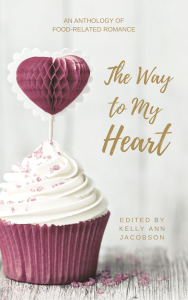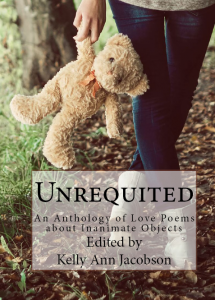FAQ: Anthologies
A few weeks ago I spoke to sixth graders at a local elementary school about anthologies, which they were making for a class. Since I often get asked a lot of the same questions by adults, I thought I would write up some of my answers in a blog post, and I also solicited for questions via social media. If you have a question I didn’t answer, please ask it in the comments!
***
How did you start making anthologies?
My first anthology, Answers I’ll Accept: True Accounts of Online Dating, was inspired by my personal life. I had met my own boyfriend (now husband) online, and I was curious to hear how other people had fared when looking for love on sites like Match and OKCupid. After the first book came out, people asked me what my plans were for the next one, and so it went for the next four books. I always think each book will be my last, but then a few months later I have a great idea and end up putting out another call.
When I first started making anthologies, most of the submissions were from my friends. I’m lucky enough to have a wonderful writing friend group in DC, especially since I was a creative writing minor in undergrad at George Washington University and a fiction major during my masters at Johns Hopkins University. Even some of my former teachers have submitted, which was such an honor for me. As the anthologies have become better known, I’ve received a lot of submissions from people I don’t know—even from other countries! I also now solicit submissions through places like Duotrope or Entropy. From there, submitters now use Submittable in order to submit their poems or short stories (email eventually became too unwieldy).
How do you come up with the themes for your anthologies?
Usually I come up with an idea by thinking of a book that I want to read that doesn’t exist yet. I also usually try to mash a new genre (such as fantasy, romance, etc) with another unique twist (epistolary fiction, love poems about inanimate objects instead of people, etc).
What is your favorite part about making anthologies?
By far my favorite part is seeing the joy on my contributors’ faces when they read at our book launch party. For some, this is their first publication, and that is such a gift to be able to give to them. They also can add the publication to their biography, which hopefully will help them on their career paths if they’re just starting out.
Do you put your own work in your anthologies?
Have you ever written something and thought, “This is amazing!”? Then, when you go back and  read it a day, or a week, or a month later, you realize it’s terrible? That’s exactly why I don’t put my own work in my anthologies. Since I am the editor, me putting my own work in a book means that I think it’s better than all of the other submissions that I received, and I just don’t know how I could do that since I’m the one that wrote it. I can’t be objective.
read it a day, or a week, or a month later, you realize it’s terrible? That’s exactly why I don’t put my own work in my anthologies. Since I am the editor, me putting my own work in a book means that I think it’s better than all of the other submissions that I received, and I just don’t know how I could do that since I’m the one that wrote it. I can’t be objective.
How much money do you make on your anthologies?
I get this question a lot, though weirdly there are almost no other careers where strangers ask you how much money you make doing them. When it comes to anthologies, I just laugh when answering.
My goal with an anthology is not to make money at all, but just to break even. I do a contest with my anthologies, which means the winner and the runner up get money, so that’s already $75. Then I always send every contributor a copy of the book, which let’s just say is about five dollars a person. For some of my poetry anthologies, I have over fifty contributors! Then there is the book launch party to think about, such as snacks and wine.
After all of this is said and done, it’s amazing if I can actually make enough money to cover my expenses. I think I’ve only ever actually made any money on one of my anthologies, but that’s not why I make them anyway. I make them because they’re fun, and they make people happy, and they make me happy to put together. They’re works of art.
In an ideal world, I believe all writers should be paid for their work. However, since they’re not and I’m a writer myself, I don’t have the money to do that. The best that I can do is have a contest, so there is always one winner and one runner up who are given a cash award for their work. I always get a guest judge for this award, and it is always judged anonymously.
How do you make your covers?
It depends which one you mean. One of them has one of my dad’s photographs on it, one of them was illustrated by one of my art students, and the rest I have made with free software and photographs that I have bought online and altered to fit the theme and mood of the book. They are always inspired by at least one of the pieces in the book or the title.
How do you order the pieces?
If you follow me on Instagram, you’ve seen the photos of this process. Usually I print all of the accepted pieces, lay them out on the floor, and physically put them in the order I want them to go. This is extremely helpful in the case of poetry anthologies like Unrequited, in which I ended up grouping the poems by topic.
How do you actually go about printing the book?
I use CreateSpace, which is Amazon’s free self-publishing platform. They have a handy template  you can download and adjust to your own needs, and I like the quality of the print-on-demand paperbacks.
you can download and adjust to your own needs, and I like the quality of the print-on-demand paperbacks.
How do you select the pieces you accept?
I usually look for submissions with the following traits:
- The submission fits the requirements. (You’d be amazed at how many poems or stories that rules out…)
- I don’t have anything like it yet in my accepted submissions.
- The piece fits with the rest of the accepted pieces. This is a hard one to explain, but though I start an anthology with almost no plan for the book, one always starts to emerge as I read submissions and start to accept the poems or stories I’m in love with. In a way, it feels like the book takes on a life of its own. This is important for writers to understand, as I think many magazine submissions work this way as well—when editors say they like a piece but it just doesn’t “fit,” they probably really mean it.
How long does it take to make an anthology?
I usually have a few month submission period, and then it takes me another few months to select the pieces, edit them, make the actual book, and edit the whole thing again after I close submissions. Sometimes it takes longer, depending on what else I have going on at the time.
When accepting stories for an international anthology in English, with writers from different countries, is it important to keep the rules for punctuation and spelling focused on either American English or British English throughout the book, for the anthology to look cohesive, or do you think it best to respect the stories’ original spelling/punctuation?
 This is an issue that I had think a lot about when I first started getting international submissions. Personally, I have decided to use American English for my anthologies since they are published here in the United States, and I usually do the work of changing all of the spellings to make the book cohesive. These edits are approved by the contributors, of course, and I definitely explain that I want the book to work as a whole. Even though it’s composed of individual submissions, those submissions combine to become a new thing entirely, and I want the reader to get that impression as they read, not for them to be drawn out of the book when noticing a shift in spelling/punctuation (or, as also might happen, thinking those punctuation/spelling changes are grammatical mistakes that I missed if they are not familiar with British English). Great question!
This is an issue that I had think a lot about when I first started getting international submissions. Personally, I have decided to use American English for my anthologies since they are published here in the United States, and I usually do the work of changing all of the spellings to make the book cohesive. These edits are approved by the contributors, of course, and I definitely explain that I want the book to work as a whole. Even though it’s composed of individual submissions, those submissions combine to become a new thing entirely, and I want the reader to get that impression as they read, not for them to be drawn out of the book when noticing a shift in spelling/punctuation (or, as also might happen, thinking those punctuation/spelling changes are grammatical mistakes that I missed if they are not familiar with British English). Great question!
Do you ever have help making your anthologies?
Yes! I was SO lucky to have help editing the poetry submissions on the most recent anthology, The Way to My Heart: An Anthology of Food-Related Romance, from the wonderful Sarah Ann Winn. If you’re interested in volunteering to help with future anthologies, definitely let me know!
***
Have a question I didn’t answer? Ask it in the comments!


Leave a Reply